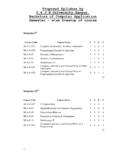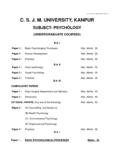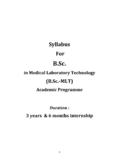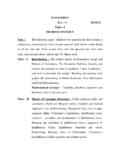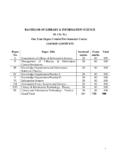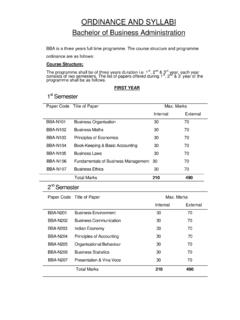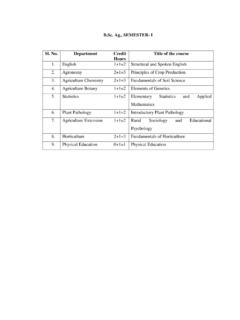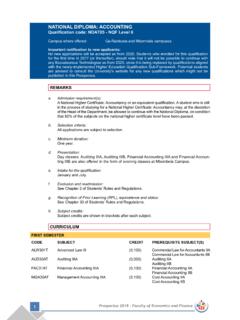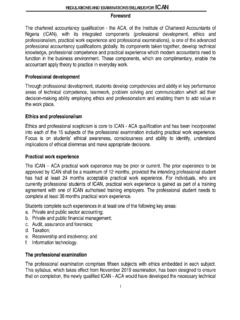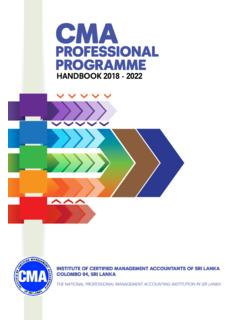Transcription of MBA BUSINESS ECONOMICS FIRST SEMESTER 101 …
1 MBA BUSINESS ECONOMICS FIRST SEMESTER 101 MANAGEMENT CONCEPT & PROCESSES 102 MANAGERIAL ECONOMICS 103 BUSINESS ENVIRONMENT 104 financial accounting 105 QUANTITATIVE METHODS 106 COMPUTER APPLICATIONS IN MANAGEMENT 107 BUSINESS LEGISLATION 108 INDIAN ETHOS & VALUES MBA ( BUSINESS ECONOMICS ) IST SEM. 101 MANAGEMENT CONCEPT & PROCESSES UNIT-1 Introduction and Approaches to Management : Concept of Management and its significance, Managerial Roles, Evolution of Management Theory Classical, Neo-classical and Modern School of Management, approaches to Management, Micro and Macro Environment for Managers, Management levels and Management skills, Functional Areas of Management.
2 Management as Profession UNIT-2 Planning and Decision Making: Concept, Process, Types and Significance of Planning, Concept, Types and Process of Setting Objectives; Planning Tools, Concept, Process and Managerial Implications of MBO, Concept, Process, Types and Styles of Decision Making, Environments of Decision Making UNIT-3 Organizing principles and process: Nature, Principles, process and significance of organizing. organizational structure and Design, approach to Organization Design, Departmentation UNIT-4 Staffing and Directing Meaning, importance and elements of staffing, Concept, Nature, Scope, Principles of Direction, Manager versus leaders, Leadership Theories, Approaches to leadership, Motivation Concept, Theories and Implications, Communication , Barriers to effective communication UNIT-5 Controlling : Nature, Process and Aspect of Control, Control Tools and Techniques , Managing Productivity, Quality Control , case studies on relevant issues SUGGESTED READINGS: 1.
3 Stephen P. Robbins and Mary Coulter, 'Management', Prentice Hall of India, 2. Charles W L Hill, Steven L McShane, 'Principles of Management', Mcgraw Hill Education, Special Indian Edition. 3. Hellriegel, Slocum & Jackson, ' Management -A Competency Based Approach , Thomson South Western, 10th edition, 2007. 4. Harold Koontz, Heinz Weihrich and Mark V Cannice, 'Management -A global perspective 5. Griffin, Management: Principle & Applications, Cengage Learning 6. Rao, Principles of Management, Himalaya Publishing 7. Mukherjee, Principles of Management and Organizational behavior, Tata McGraw Hill MBA ( BUSINESS ECONOMICS ) IST SEM.
4 102 MANAGERIAL ECONOMICS UNIT-1 Nature and Scope of Managerial ECONOMICS : Nature, Scope and Significance of managerial ECONOMICS , Role and Responsibility of managerial economists. UNIT-2 Utility and Indifference Curve Analysis: Utility analysis, Measurement of utility, Law of diminishing marginal utility, Indifference curve, Consumer s equilibrium - Budget line and Consumer surplus. UNIT-3 Demand and Production Analysis: Law of demand, Factors affecting demand, Elasticity of demand, Techniques of forecasting demand - Survey and Statistical methods. Production function with one variable input or law of variable proportions, Production function with two variable inputs or isoquant, Production function with all variable inputs or Return to scale, Law of supply and classification of cost.
5 Practical Problems. UNIT-4 Market Structure and Pricing: Different market structure, Price and output determination under perfect competition, Monopoly, Monopolistic competition, Oligopoly. Price Determination under Discriminating Monopoly. UNIT-5 Profit Management: Concept, Nature and Measurement of profit, Concept of risk and uncertainty, Risk uncertainty and innovations. Theories of profit, Profit planning and forecasting, Profit policies, BUSINESS cycle - Causes and Control. SUGGESTED READINGS: 1. Managerial ECONOMICS : by Varshney & Maheshwari Pub, Sultan Chand. 2. Mote, Paul & Gupta-Managerial ECONOMICS : Concepts & Cases.
6 3. Dwivedi-Managerial ECONOMICS 4. Hague-Managerial ECONOMICS . 5. Savage & Small-Untroduction to Managerial ECONOMICS . 6. Stocks-Managerial ECONOMICS . 7. Riggs- ECONOMICS decision Models. 8. Cohen & Cyert-Theory of the Firms. 9. D. Gopalkrishna-A study of Managerial ECONOMICS . 10. Brigham and Pappas-Managerial ECONOMICS . 11. Habib-Ur-Rehman-Managerial ECONOMICS . MBA ( BUSINESS ECONOMICS ) IST SEM. 103 BUSINESS ENVIRONMENT OBJECTIVE: This course develops ability to understand and scan BUSINESS environment in order to analyze opportunities and take decisions under uncertainty. UNIT-1 Theoretical Framework of BUSINESS Environment: Concept, significance and nature of BUSINESS environment; Element of environment internal and external; Changing dimensions of BUSINESS environment; Techniques of environmental scanning and monitoring.
7 UNIT-2 Economic Environment of BUSINESS : Significance and elements of economic environment; Economic systems and BUSINESS environment; Economic planning in India; Government policies industrial policy, fiscal policy, monetary policy, EXIM policy; Public Sector and economic development; Development banks and relevance to Indian BUSINESS ; Economic reforms, liberalization and structural adjustment programmes. UNIT-3 Political and Legal Environment of BUSINESS : Critical elements of political environment; Government and BUSINESS ; Changing dimensions of legal environment in India; MRTP Act, FEMA and licensing policy; Consumer Protection Act.
8 UNIT-4 Socio-Cultural Environment: Critical elements of socio-cultural environment; Social institutions and systems; Social values and attitudes; Social groups; Middle class; Dualism in Indian society and problems of uneven income distribution; Emerging rural sector in India; Indian BUSINESS system; Social responsibility of BUSINESS ; Consumerism in India. UNIT-5 International and Technological Environment: Multinational corporations; Foreign collaborations and Indian BUSINESS ; Non-resident Indians and corporate sector; International economic institutions WTO, World Bank, IMF and their importance to India; Foreign trade policies; Impact of Rupee devaluation; Technological environment in India; Policy on research and development; Patent laws; Technology transfer.
9 REFERENCES: 1. Adhikary, M: Economic Environment of BUSINESS , Sultan Chand & Sons, New Delhi. 2. Ahluwalia, : Industrial Growth in India, Oxford University Press, Delhi. 3. Alagh, Yoginder K: Indian Development Planning and Policy, Vikas Publication, New Delhi. MBA ( BUSINESS ECONOMICS ) IST SEM. 104 financial accounting UNIT-1 financial accounting -scope and importance, meaning, nature and rue of accounting in BUSINESS , accounting concepts and conventions. UNIT-2 accounting Mechanics: basic records, understanding of transactions and related documents, process leading to preparation of trial balance, understanding of P. & L.
10 A/C and Balance street of non-corporate entities UNIT-3 Final Accounts of a Joint Stock Company: Depreciation accounting and policy: company law provisions relating to preparation of various financial statements, preparation of final accounts of a joint stock company as per provisions of Companies Act-2013 UNIT-4 financial Statements Analysis: Nature, functions and limitations of financial statements, analysis and interpretation of financial statements. Major tools of financial analysis: ratio analysis, capital structure ratios, profitability ratios, activity ratios. UNIT-5 Indian accounting Standards:, Introduction to Indian accounting Standards and IFRS, Preparation of cash flow statements, measurement of BUSINESS income, Earning Per Share, Techniques of inflation accounting , Recent trends in accounting SUGGESTIVE READINGS: 1.
